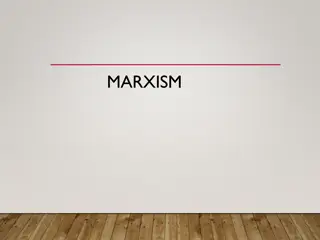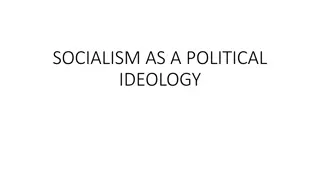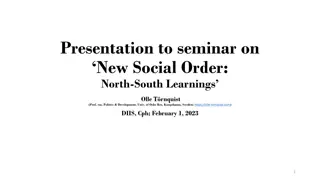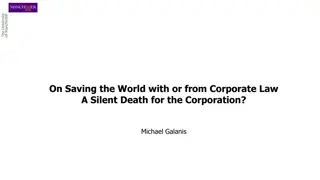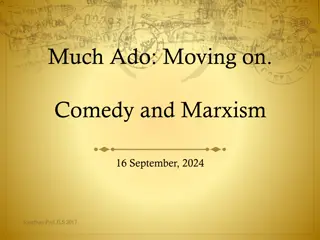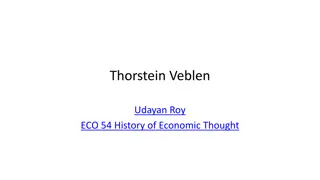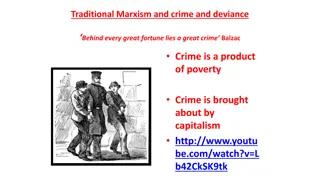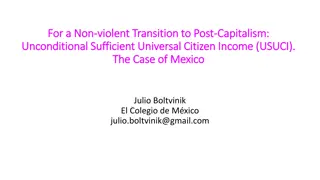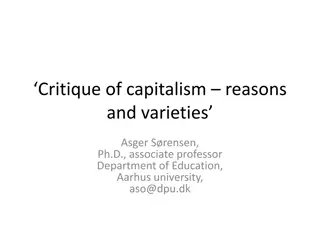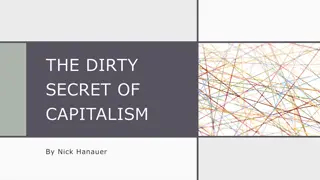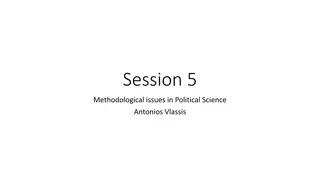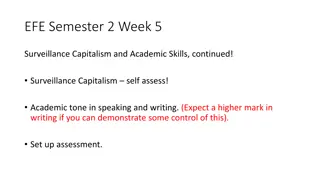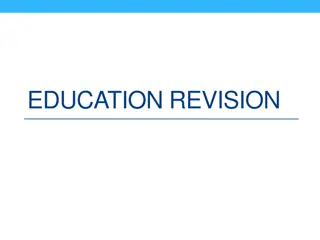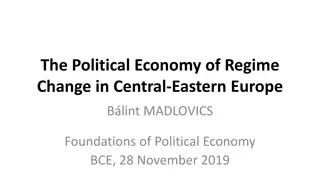Understanding Marxism and Capitalism
Marxism is a body of social, political, and economic thought derived from the works of Karl Marx and Friedrich Engels, focusing on the analysis of capitalism. Capitalism is an economic system where private individuals own goods and services based on market supply and demand. The purest form of capitalism is laissez-faire, advocating minimal government intervention. Marx identified class struggle between the bourgeoisie (owners) and proletariat (workers), emphasizing the evolving nature of social classes.
Download Presentation

Please find below an Image/Link to download the presentation.
The content on the website is provided AS IS for your information and personal use only. It may not be sold, licensed, or shared on other websites without obtaining consent from the author. Download presentation by click this link. If you encounter any issues during the download, it is possible that the publisher has removed the file from their server.
E N D
Presentation Transcript
Marxism is a body of social, political, and economic thought derived from the writings of Karl MARX and his collaborator, Friedrich ENGELS. At the centre of Marx's work is his analysis of CAPITALISM. How capitalism arose, how it works (for whom it works better and for whom worse), and where it is likely to lead.
Capitalism is an economic system in which private individuals capital goods. or businesses own The production of goods and services is based on supply and demand in the general market known as a market economy. Rather than through central planning known as a planned economy or command economy.
The purest form of capitalism is free market or laissez-faire capitalism. Here, private individuals are unrestrained. They may determine where to invest, what to produce or sell, and at which prices to exchange goods and services. The lissez-faire market without checks or control. place operates
Laissez-faire is an economic theory from the 18th century that opposed any government intervention in business affairs. The driving principle behind laissez-faire, a French term that translates to "leave alone" (literally, "let you do"), is that the less the government is involved in the economy, the better off business will be, and by extension, society as a whole. Laissez-faire economics is a key part of free- market capitalism.
Concentrating on the social and economic relations in which people earn their livings, Marx saw behind capitalism's legal facade a struggle of two main classes: i. BOURGEOISIE, who own the productive resources, and the workers, or ii. PROLETARIAT, who must work for wages in order to survive.
Marx did recognize the existence of two other classes, the Petty Bourgeoisie and the Lumpen Proletariat, he argued that these two classes would disappear over time.
The Marxist advocates that class struggle between the two economic classes is the true fact. The working class in some of the countries are not so much empowered to overthrow the ruler. There is need to end the exploitation of working class.
The working classes are exploited by the owner class due to following reasons as the workers are oppressed wage slaves and cannot fight against the system. They always believed that what are told by the powerful is to be followed. According the Marxist Philosophy the social classes are competing in essence for control of the State.
The Production also controls the State. Marx s opinion was to find out the reality behind the veil of politics : the economic structure of the society. class that control the Mode of
Key ideas of Marxism WITHOUT ABILITY TO PRODUCE MASS DEPENDENDENT ON ELITE FOR SURVIVAL INDUSTRIALIZATION (ELITE HAD ACCESS TO M EANS OF PRODUCTION) MAJORITY IS PROLETARIAT BY THEIR LABOUR, STRENGTH AND TIME HELP THEM MAKE LIVING FOR MAXIMUM PROFIT ELITE USES LABOUR OF MASS AT LOW COST KEY IDEAS Power held by bourgeoisie had access to capital uses money to generate wealth ELITE NEEDED MASS TO ACCEPT THAT THEY ARE POWERLESS.
Communism is a political philosophy which argues that all men and women should have equal right to wealth. The economic system is characterized by the collective ownership of organization of labour for common advantage of all members. property and by
Materialist theory The most important thing in the society for the people is survival. And all are producing means of subsistence for themselves. Production is primary. It is a necessary pre-condition for everything else. One can not think or philosophize with empty stomach that means one must be fed.
Base : how stuffs is produced . Superstructure : rules, customs, laws and beliefs determining the wealth should be distributed .
Economic base Economic relations determine social relations, and social institutional practices(i.e. superstructure). In every society surplus is produced but how surplus is to be distributed will be governed according to different rules . And the way how surplus is produced influences their ideas about how to distribute it.
In his Historical Materialism he stated that the human being form ideas under the influence of circumstances after that ideas compel them to change circumstances. According to this theory there is need to predict results not intentions. According to Marx capitalism leads to conflict of interest as worker produce the wealth but receive low wages. exploitation. This is
Surplus Value is value which worker what produces above what they receive as wage. Capitalists aim is to keep the wages low and also to introduce the labour saving machinery to increase output and reduce cost. Classless society, in Marxism, the ultimate condition of social organization, expected to occur when true communism is achieved
According to Karl Marx (181883), the primary function of the state is to repress the lower classes of society in the interests of ruling class. However, after the class struggle has resulted in the victory of the establishment of a socialist society, there will be no further need for such a repressive institution; with the disappearance of classes, the state is expected to wither away . the proletariat and the
Marx made class struggle the central fact of social evolution. The history of all hitherto existing human society is the history of class struggles. With the development of capitalism, the class struggle takes an acute form. Two basic classes, around which other less important classes are grouped, oppose each other in the capitalist system: the owners of the means of production, or bourgeoisie, and the workers, or proletariat.
The bourgeoisie produces its own grave- diggers. The fall of the bourgeoisie and the victory of the proletariat inevitable Thus Marx thought that the capitalist system inherently contained the seeds of its own destruction. The alienation and exploitation of proletariat that are fundamental to capitalist relations would inevitably drive the working class to rebel against the bourgeoisie and seize control of the means of production. are equally the
This revolution would be led by enlightened leaders, known as the vanguard of proletariat, who understood structure of society and who would unite the working class by raising awareness and class consciousness. Accordingly private ownership of the means of production would be replaced by collective ownership, under then communism. Final stage of human development, social classes and class struggle would no longer the class the socialism first and
Marxism focuses on the struggle between capitalists and the working class. Marx wrote that the power relationships between capitalists inherently exploitative and would inevitably create class conflict. He believed that this conflict would ultimately lead to a revolution in which the working class would overthrow the capitalist class and seize control of the economy. and workers were
Criticisms Many of borne out. Marx believed that increasing competition, rather than producing consumers, would lead to bankruptcy among capitalists and the rise of monopolies, as fewer and fewer were left to control production. But the Bankruptcy of former capitalists would leads them to be the part of the proletariat, eventually creating an army of the unemployed. Marx s predictions have not been better goods for
In addition, the market economy, which by its nature is unplanned, would experience huge supply-and-demand severe depressions. Even the wages of increased and profit have decline although that could not the situation of inequality subsisting in the various capitalist society. problems and cause the working class economic



